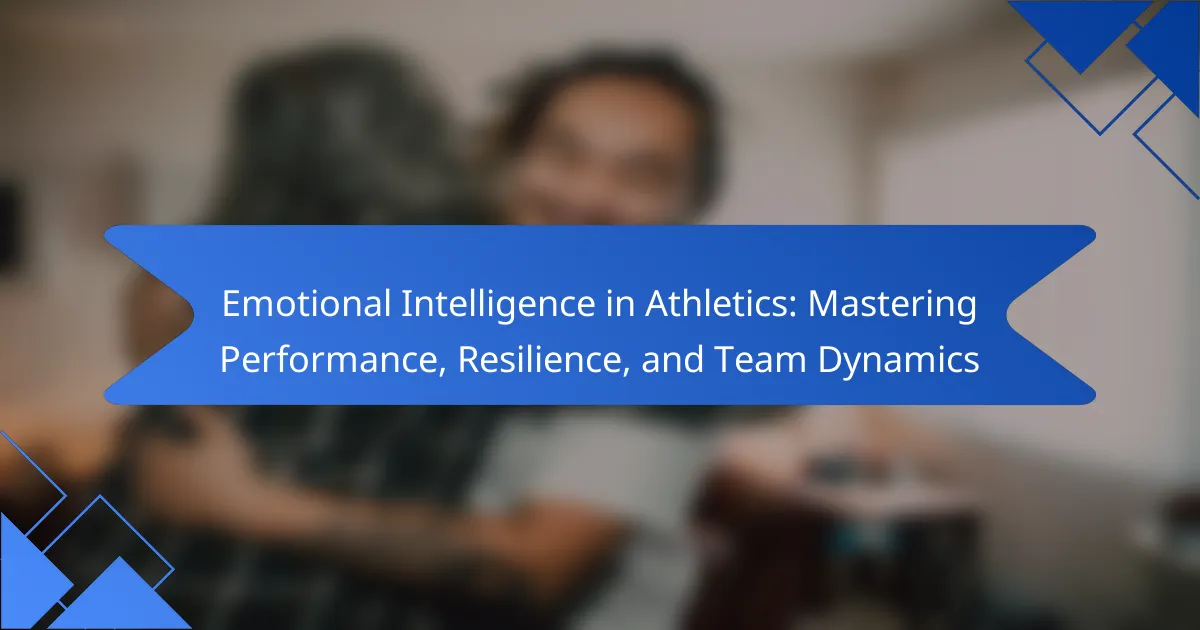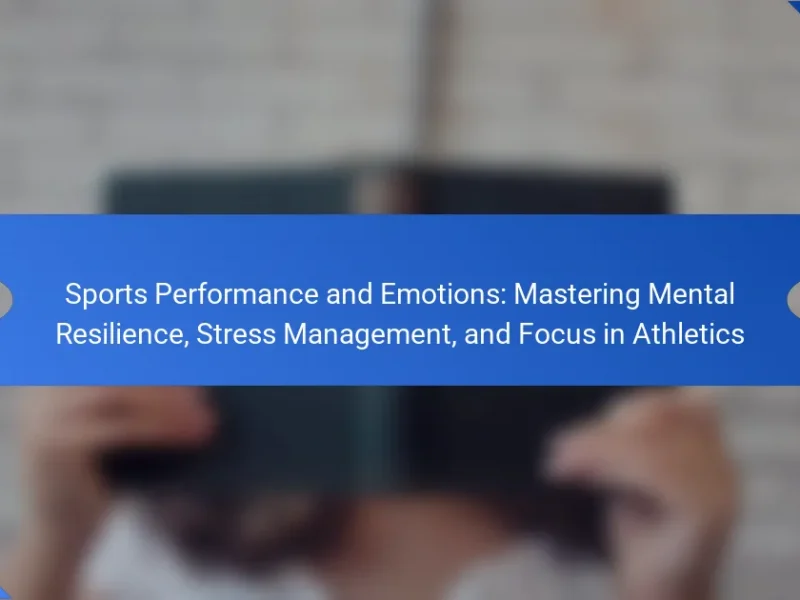Emotional intelligence in athletics significantly enhances performance, resilience, and team dynamics. Athletes can manage stress, communicate effectively, and build strong relationships. Key attributes include emotional regulation, tailored strategies, and adaptability to various situations. Coaches can implement structured training and feedback to foster these skills in athletes.

What is Emotional Intelligence in Athletics?
Emotional intelligence in athletics enhances performance, resilience, and team dynamics. Athletes with high emotional intelligence can manage stress, communicate effectively, and foster strong relationships. This skill set leads to improved decision-making during competitions and better collaboration within teams. Research shows that emotionally intelligent athletes often exhibit higher levels of motivation and adaptability, essential traits for success in high-pressure environments. Developing emotional intelligence can significantly impact an athlete’s overall effectiveness and longevity in their sport.
How does Emotional Regulation impact athletic performance?
Emotional regulation significantly enhances athletic performance by improving focus, resilience, and teamwork. Athletes who manage their emotions effectively can maintain composure under pressure, leading to better decision-making and execution during competitions. Research indicates that emotional intelligence correlates with increased performance metrics, such as improved reaction times and reduced anxiety levels. Consequently, athletes who develop emotional regulation skills often demonstrate superior adaptability in high-stakes situations, fostering a positive team environment and promoting overall success.
What role does Emotional Intelligence play in team dynamics?
Emotional Intelligence significantly enhances team dynamics by fostering communication and collaboration. It enables athletes to understand their emotions and those of their teammates, leading to improved relationships. High emotional intelligence promotes empathy, allowing team members to support each other during challenges. As a result, teams exhibit greater resilience and adaptability, essential for success in athletics. Effective emotional regulation contributes to maintaining focus and managing stress, ultimately enhancing overall performance.
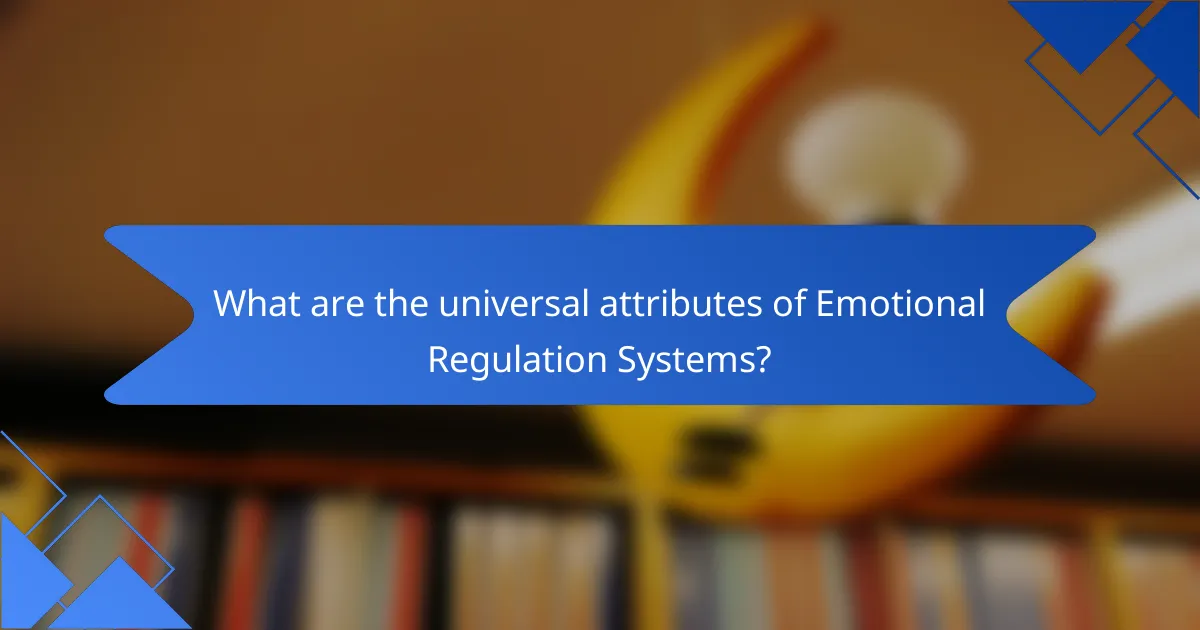
What are the universal attributes of Emotional Regulation Systems?
Emotional Regulation Systems possess universal attributes that enhance emotional intelligence in athletics. These attributes include awareness, control, adaptability, and resilience. Awareness allows athletes to recognize their emotions, while control enables them to manage emotional responses. Adaptability helps athletes adjust to varying situations, and resilience fosters recovery from setbacks. Each attribute plays a critical role in optimizing performance and improving team dynamics.
How do Emotional Regulation Systems enhance resilience in athletes?
Emotional regulation systems significantly enhance resilience in athletes by enabling them to manage stress and maintain focus during competition. These systems foster self-awareness, allowing athletes to recognize and adjust their emotional responses. Improved emotional control leads to better performance under pressure, as athletes can remain calm and make strategic decisions. Furthermore, emotional regulation contributes to positive team dynamics, as athletes who manage their emotions effectively can better support their teammates. This holistic approach to emotional intelligence ultimately strengthens an athlete’s resilience, enhancing their ability to bounce back from setbacks.
What common strategies are used for emotional regulation in sports?
Athletes commonly use strategies like mindfulness, cognitive restructuring, and emotional awareness for emotional regulation. These techniques enhance performance and resilience in high-pressure situations. Mindfulness helps athletes stay present, reducing anxiety. Cognitive restructuring allows them to reframe negative thoughts, promoting a positive mindset. Emotional awareness fosters understanding of feelings, aiding in effective communication and teamwork.
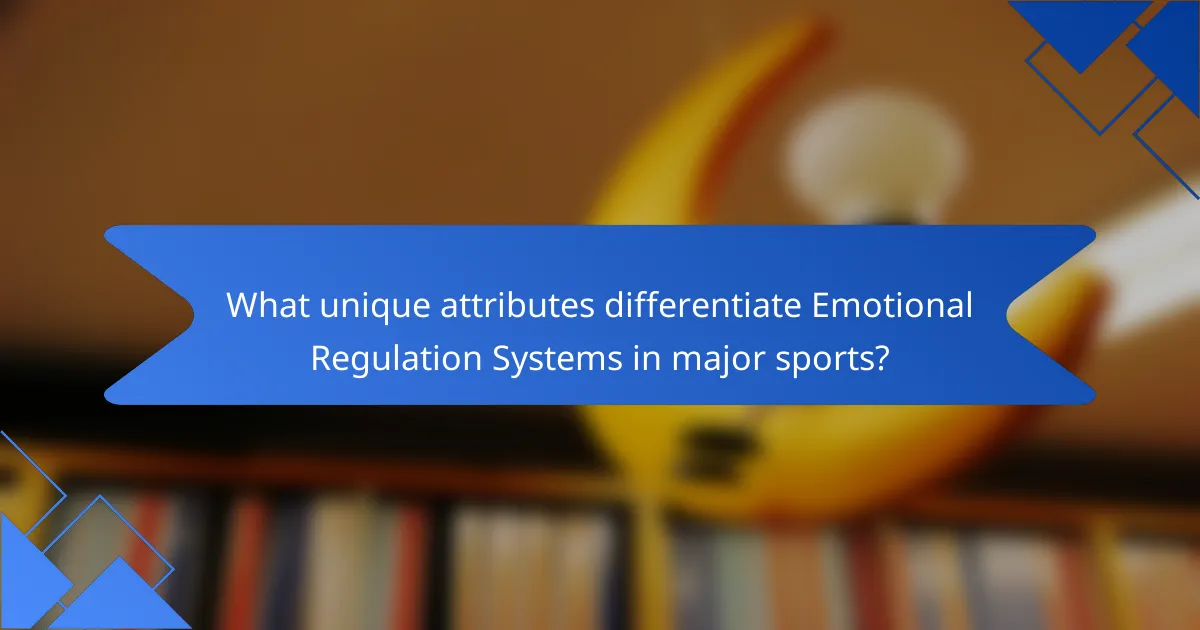
What unique attributes differentiate Emotional Regulation Systems in major sports?
Unique attributes that differentiate Emotional Regulation Systems in major sports include tailored strategies, environmental influences, and team dynamics. Tailored strategies involve specific techniques athletes use to manage emotions during competition, enhancing focus and performance. Environmental influences encompass factors like crowd presence and media scrutiny, which can impact emotional responses. Team dynamics play a crucial role, as supportive relationships can foster resilience and emotional stability. These attributes contribute to an athlete’s overall emotional intelligence, directly affecting performance outcomes.
How do elite athletes utilize emotional regulation techniques?
Elite athletes utilize emotional regulation techniques to enhance performance and maintain focus under pressure. Techniques include mindfulness, cognitive restructuring, and visualization, which help manage anxiety and boost confidence. Research indicates that athletes who practice these techniques demonstrate improved resilience and better team dynamics. For instance, mindfulness training can lead to a 20% increase in performance consistency during high-stakes competitions.
What specific training programs focus on emotional intelligence?
Many training programs focus on emotional intelligence in athletics, enhancing performance and team dynamics. Notable programs include the Emotional Intelligence Training for Coaches, the Sport Psychology and Mental Skills Training, and the Team Dynamics Workshop. These programs emphasize self-awareness, emotional regulation, and interpersonal skills, crucial for athletic success. They provide athletes with tools to manage stress, enhance resilience, and improve communication within teams.
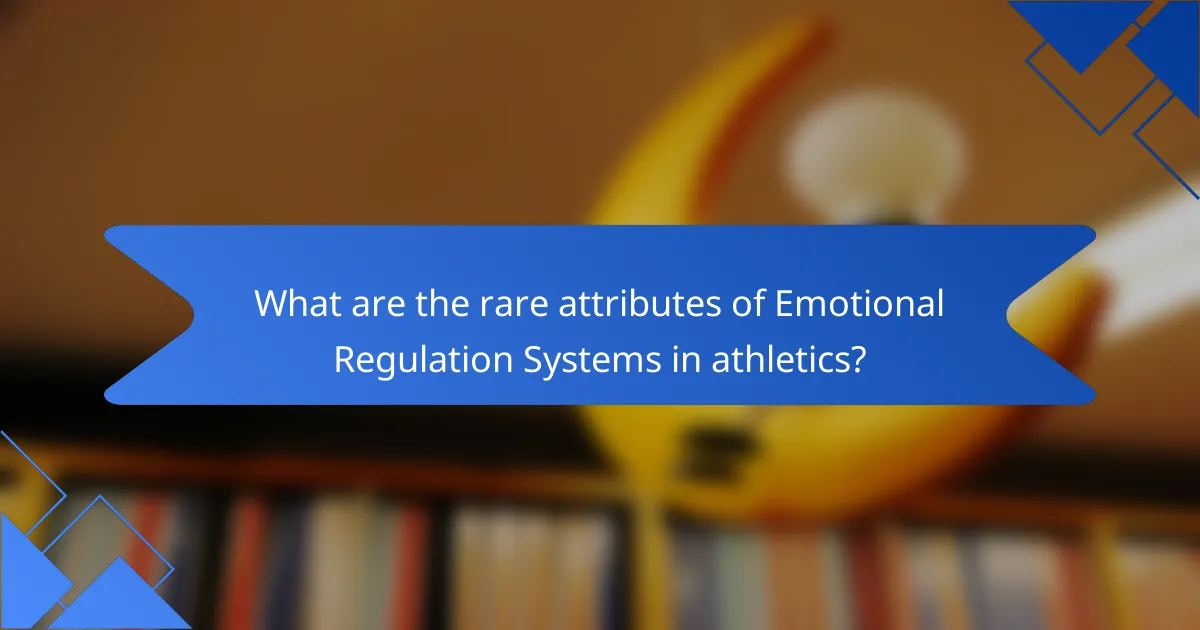
What are the rare attributes of Emotional Regulation Systems in athletics?
Emotional Regulation Systems in athletics exhibit rare attributes that enhance performance under pressure. One rare attribute is the ability to adapt emotional responses based on situational demands, allowing athletes to maintain focus during competitions. Another unique aspect is the integration of mindfulness techniques, which helps in managing anxiety and improving concentration. Additionally, the capacity for emotional contagion within teams fosters a supportive environment, enhancing overall team dynamics. These attributes collectively contribute to resilience and optimal performance in high-stakes situations.
How do cultural factors influence emotional regulation in sports?
Cultural factors significantly shape emotional regulation in sports by influencing athletes’ responses to stress and teamwork. For instance, collectivist cultures emphasize group harmony, promoting emotional restraint, while individualistic cultures encourage self-expression. These cultural norms affect how athletes manage emotions during competition, impacting performance and resilience. Additionally, cultural attitudes towards failure and success can dictate emotional responses, shaping team dynamics and individual motivation. Understanding these influences is crucial for coaches and athletes aiming to enhance emotional intelligence in athletics.
What are the psychological assessments used to measure emotional intelligence in athletes?
Psychological assessments used to measure emotional intelligence in athletes include the Emotional Quotient Inventory (EQ-i), Trait Emotional Intelligence Questionnaire (TEIQue), and the Mayer-Salovey-Caruso Emotional Intelligence Test (MSCEIT). These tools evaluate attributes like self-awareness, emotional regulation, and interpersonal skills. The EQ-i focuses on emotional and social functioning, while the TEIQue assesses trait-based emotional intelligence. The MSCEIT measures performance-based emotional intelligence through problem-solving tasks. Each assessment contributes uniquely to understanding an athlete’s emotional intelligence and its impact on performance, resilience, and team dynamics.
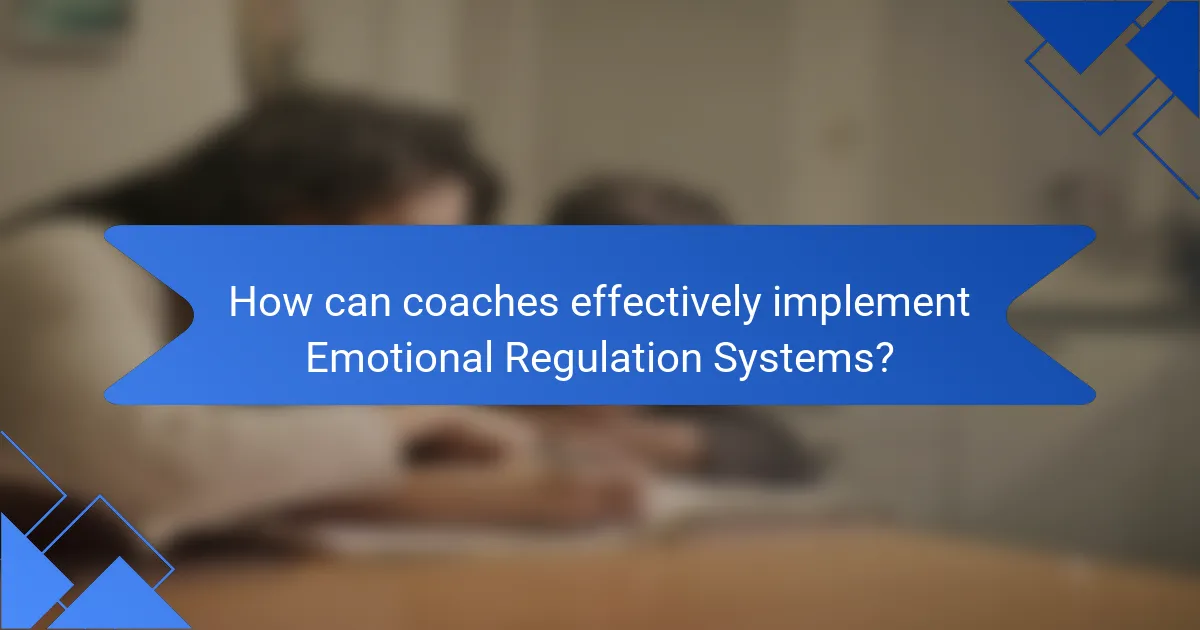
How can coaches effectively implement Emotional Regulation Systems?
Coaches can effectively implement Emotional Regulation Systems by integrating structured training and consistent feedback. Establish clear guidelines for emotional expression and create a safe environment for athletes to practice these skills. Regular workshops can enhance understanding and application of emotional intelligence principles. Incorporate real-time feedback to reinforce positive emotional responses during training sessions.
What best practices should coaches follow for emotional intelligence training?
Coaches should prioritize self-awareness, empathy, and communication in emotional intelligence training. Implement regular feedback sessions to enhance team dynamics. Encourage open discussions to build trust and resilience among athletes. Utilize role-playing exercises to practice emotional regulation and conflict resolution skills. Integrate mindfulness practices to improve focus and emotional control during high-pressure situations.
What common mistakes do coaches make when addressing emotional regulation?
Coaches often overlook the importance of emotional regulation in athletes, leading to ineffective communication and support. Common mistakes include failing to recognize individual emotional triggers, neglecting to model emotional awareness, and not providing adequate coping strategies. These oversights can hinder athletes’ performance and resilience. Coaches should prioritize emotional intelligence training to enhance team dynamics and athlete well-being.
How can coaches create a supportive environment for emotional growth?
Coaches can create a supportive environment for emotional growth by prioritizing open communication and trust. Establishing a culture that values emotional intelligence fosters resilience and enhances team dynamics. Regular check-ins and feedback sessions encourage athletes to express their feelings, promoting a sense of belonging. Implementing team-building activities strengthens relationships, allowing athletes to support each other. Furthermore, providing resources for mental health and emotional well-being demonstrates commitment to athletes’ holistic development. This approach not only improves individual performance but also cultivates a cohesive team atmosphere.
What tools can coaches use to assess athletes’ emotional intelligence?
Coaches can use various tools to assess athletes’ emotional intelligence, including self-assessment questionnaires, peer feedback forms, and performance analytics software. These tools help identify emotional awareness, regulation, and interpersonal skills. Self-assessment questionnaires, like the Emotional Quotient Inventory, provide insights into an athlete’s self-perception. Peer feedback forms, such as 360-degree evaluations, offer perspectives from teammates and coaches. Performance analytics software can track emotional responses during competitions, highlighting areas for improvement.
What actionable tips can athletes apply for better emotional regulation?
Athletes can enhance emotional regulation by practicing mindfulness techniques, maintaining a balanced routine, and fostering open communication with teammates. Regular mindfulness meditation improves focus and reduces anxiety, while a structured training schedule promotes emotional stability. Encouraging dialogue within teams builds trust and emotional support, crucial for resilience in high-pressure situations.
